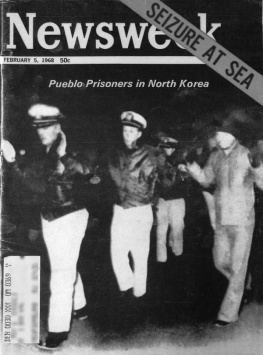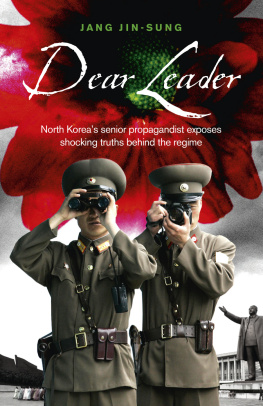
The Capture of the USS Pueblo
The Incident, the Aftermath and the Motives of North Korea
James Duermeyer

McFarland & Company, Inc., Publishers
Jefferson, North Carolina
LIBRARY OF CONGRESS CATALOGUING DATA ARE AVAILABLE
BRITISH LIBRARY CATALOGUING DATA ARE AVAILABLE
e-ISBN: 978-1-4766-3555-2
2019 James Duermeyer. All rights reserved
No part of this book may be reproduced or transmitted in any form or by any means, electronic or mechanical, including photocopying or recording, or by any information storage and retrieval system, without permission in writing from the publisher.
Front cover images from top: Crewmen of USS Pueblo (AGER-2) leave a U.S. Army bus at the United Nations Advance Camp, following their release by the North Korean government at the Korean Demilitarized Zone on 23 December 1968 Representatives of the United States and North Korean governments meet at Panmunjom, Korea, to sign the agreement for the release of the Pueblo crew, 22 December 1968. Major General Gilbert H. Woodward, U.S. Army, Senior Member, United Nations Command Military Armistice Commission, is in the left foreground, with his back to the camera USS Pueblo (AGER-2), off San Diego, California, 19 October 1967 (official U.S. Navy photographs)
McFarland & Company, Inc., Publishers
Box 611, Jefferson, North Carolina 28640
www.mcfarlandpub.com
To the brave officers and enlisted men of the USS Pueblo who suffered months of cruel torture and mistreatment at the hands of their North Korean captors. In spite of the physical and psychological damage inflicted on the crew, their faith and hope sustained them in their darkest hours. I salute them all.
Acknowledgments
A special thank you to my wife, Janet, who encouraged me in my goal to take a different and fresh look at the fate of the USS Pueblo and its crew.
I also wish to thank Dr. Joyce Goldberg, professor of history at the University of Texas at Arlington, who kindly encouraged me, and offered sage advice while I wrote the book.
Abbreviations
AGTRAuxiliary General Technical Research
AKLAuxiliary Cargo, Light
CandCCommand and Control
CIACentral Intelligence Agency
CINCPACCommander in Chief Pacific
CINCPACFLTCommander in Chief Pacific Fleet
AGERAuxiliary General Environmental Research
CDRCommander
COMINTCommunications Intelligence
CNOChief of Naval Operations
CNFJCommander Naval Forces Japan
COCommanding Officer
COMSEVENTHFLTCommander Seventh Fleet
CTCommunications Technician
DIADefense Intelligence Agency
DMZDemilitarized Zone
DPRKDemocratic Peoples Republic of Korea (North Korea)
DTGDate Time Group
ELINTElectronic Intelligence
HUMINTHuman Intelligence
IFFIdentification Friend or Foe
JCSJoint Chiefs of Staff
JRCJoint Reconnaissance Center
KORCOMKorean Communist
KPAKorean Peoples Army (North Korea)
KWPKorean Workers Party (North Korea)
KGBCommittee for State Security in the Soviet Union
LBJLLyndon Baines Johnson Library
LCDRLieutenant Commander
LTLieutenant
LTJGLieutenant Junior Grade
MACMilitary Armistice Commission
MIGMikoyan-Gurevich (Former Russian Aircraft Builder)
MNDMinistry of National Defense (North Korea)
NAVSECGRUNaval Security Group
NKNNorth Korean Navy
NMCCNational Military Command Center
NSANational Security Agency
NSCNational Security Council
ROKRepublic of Korea (South Korea)
ROKJCSRepublic of Korea Joint Chiefs of Staff
ONIOffice of Naval Intelligence
ONIPOffice of Naval Intelligence Publications
PFIABPresidents Foreign Intelligence Advisory Board
SDSStudents for a Democratic Society
SECDEFSecretary of Defense
SIGINTSignal Intelligence
SITREPSituation Report
U.N.United Nations
UNCUnited Nations Command
USSUnited States Ship
USSRUnion of Soviet Socialist Republics
Preface
The attack and seizure of the USS Pueblo by the North Korean Navy on a frigid day in January 1968 captured world attention and angered the American public during one of the most tumultuous decades in U.S. history. Further fanning national furor was the death of one crew member and the imprisonment of the Pueblos crew of eighty-three American sailors. The Pueblo incident was another of many distracting issues that sidetracked the presidency of Lyndon Johnson. Historians Warren Cohen and Nancy Bernkopf Tucker opined that, In many ways the Pueblo affair proved a fitting capstone for a troubled presidency. Of course, the Pueblo incident assumed a low priority in comparison to the Vietnam War, the overarching geopolitical obsession of the Johnson presidency.
Within the command structure of the U.S. Navy, which I was part of for twenty years, never-ending debates swirled about where to place the blame for the loss of the ship and crew. Historical, hide-bound Navy tradition dictates that the commanding officer of a U.S. Navy ship is ultimately responsible for whatever happens to a ship under his/her command. This tenet serves well, unless the Navy has overloaded the command with numerous restrictive directives. Questionable leadership within the National Security Agency (NSA) and the Navy placed the Pueblo in an indefensible situation. Using the ultimate responsibility axiom, myopic Navy leadership took steps to punish Commander Lloyd Bucher and other crew members for what the Navy perceived as their lack of action against the North Korean attackers. In its narrow focus, the Navy fell short of identifying other points of failed responsibility within the Naval chain of command. The Navys quick-to-judge tactic of blaming Commander Lloyd Bucher resulted in overwhelming public support for Bucher and his crew, and an embarrassment for the Navy. The action of the Navys assigning Commander Bucher to be its stalking horse fooled no one. The American public learned that a series of blunders on the part of the Navy and the Johnson administration had placed the Pueblo in a perilous situation, which was not Buchers doing. Lieutenant Commander William Armbruster, a Naval Intelligence Officer, writing for the Naval War College Review in 1971, examined the effect of public opinion on the Navys decision following the Pueblo Court of Inquiry and wrote, Public opinion has historically been a potent force to be reckoned with in American political history. He went on to write, The apparent public hostility during the Court of Inquiry was possibly a factor in determining final disposition by the Navy. He continued, Many, frustrated by the system, found it easy to identify with Commander Buchera helpless victim of an insensitive, unresponsive, military bureaucracy.
Foreign policy blunders were not confined to the Navy. The White House and Johnson cabinet, the National Security Agency (NSA), and Central Intelligence Agency (CIA) all held the same short-sighted, misfocused view of international relations, that is, a belief that smaller communist nations could not act autonomously, but were instead, influenced by either the Soviet Union or China. This global misjudgment reflected a lack of cross-agency intelligence communication and poor leadership, thereby exacerbating an already embarrassing situation played out on the world stage. Following the Second World War and into the early part of the Cold War, the United States was the worlds most powerful nation. Yet, America, by the action of the North Koreans, learned a discomfiting lesson from an isolationist, autocratic country of lesser global significance. Members of the Johnson administration and the Navy were left wringing their hands as they weighed answers and responses to the
Next page











